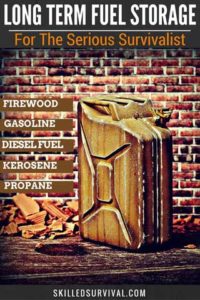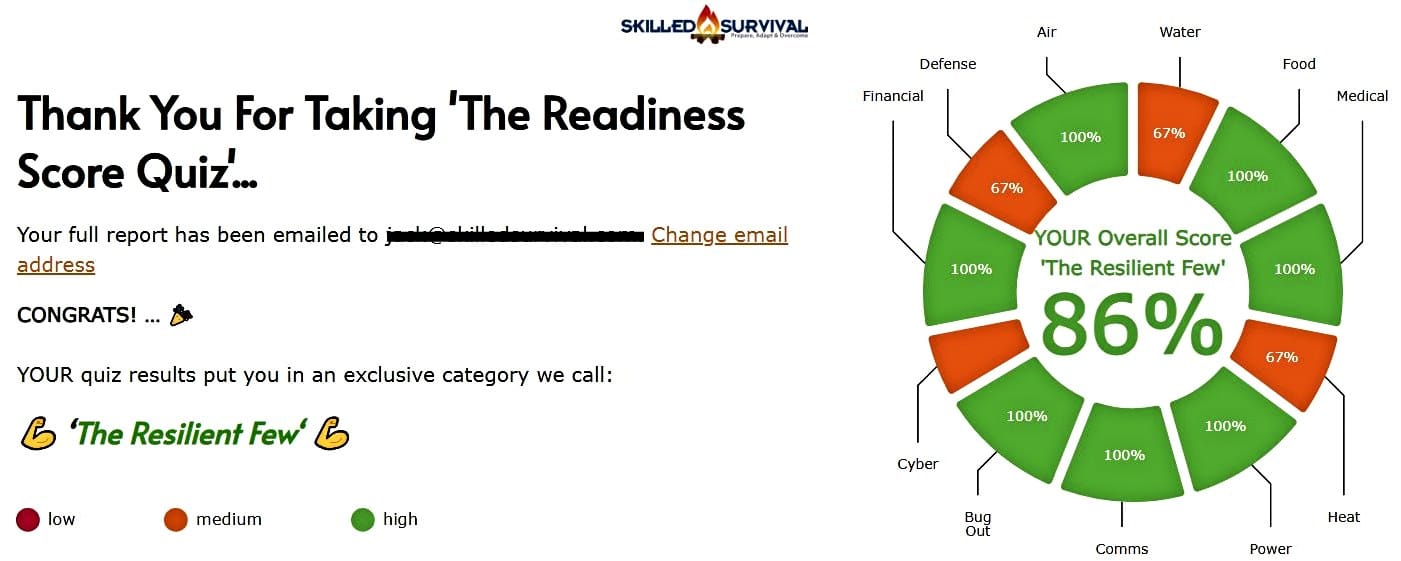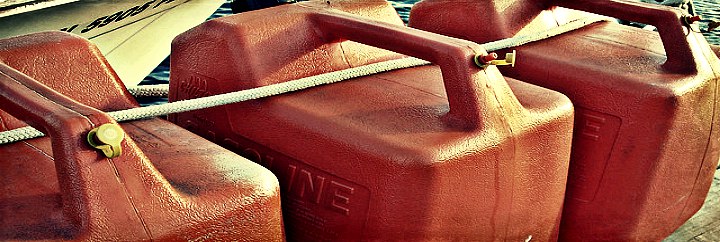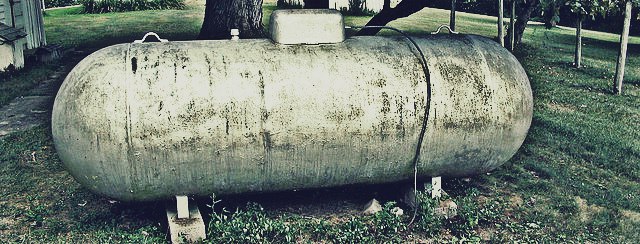
A complete guide on how to store different fuels for the long term.
Why? Because fuel provides options…and in and emergency, options are like gold.
Fuel allows you to:
- Generate heat for warmth and cooking
- Run a generator to keep refrigerators / freezers working
- Operate a vehicle to escape danger fast
- Barter with others who didn’t plan ahead
So today, let’s go over all the best long term fuels and how to store them properly…
TOPIC IN THIS GUIDE… ↓(click to jump)

Want a free 78 item bug out bag checklist?
Enter your email below to instantly download this Complete Checklist PDF. No purchase necessary. 👇 👇Fuel Storage Overview & Introduction
Storing fuel sounds simple, right?
- Just head down to your local station and fill up some cans…right?
- Just chop down a few trees, and you got firewood…
Not so fast…
Storing fuel IS way more complicated than THAT!
And the more you want to stockpile, the more complex things get.
But you want to know who’s most up to speed on how to do this properly?
Preppers!
That’s why you should watch this excellent overview video on storing fuel for emergencies:
↓ Storing Fuel for Preppers
Stockpiling Firewood
Firewood is probably the most common form of fuel to store for long-term survival.
Why?
Firewood is often abundant (location dependent), relatively inexpensive, and not complicated to store.
And there are no laws on how much you can store.
Firewood is also great for creating heat and cooking foods without electricity or chemicals.
However, there’s more to it than chopping down a tree and putting it in your fireplace.
First off, different woods have different burn properties.
Softwoods tend to be poor burners.
They burn too quickly and with a low heat output, and they also leave a lot of ash and are pungent burners.
They tend to deteriorate faster than hardwoods.
Hardwoods tend to have opposite burning properties.
They burn slowly, with high heat output.
They keep better in long-term fuel storage and produce less pungent smoke.
↓ Best firewood? Hardwood vs. Softwood
You also need to plan to allow firewood to be seasoned to get the most benefit from it.
Seasoning firewood consists of chopping it, splitting it into useable sizes.
And then storing it in a dry location for at least six months (a year is better) before use.
While there are worse things you can do than burning pre-seasoned firewood, it’s still something to be avoided. Why?
Firewood that is not properly seasoned won’t burn well (low heat output) and will create more creosote buildup in chimneys.
Creosote build-up is what causes chimney fires.
Overall, good hardwood firewood should be one of the first fuels you begin stockpiling for SHTF.
Long-Term Gasoline Storage: The Most Popular Bug Out Fuel
While there are quite a few diesel vehicles on the road, gasoline-powered engines still dominate.
Only about 3% of all US vehicles are diesel-powered.
So 97% of US road vehicles are gas-based…
What happens when SHTF and gas stations have no electricity to pump?
Or what if the gas stations are overrun with extremely long lines due to panic and go empty within hours?
You better hope you have enough long-term gasoline storage to get to your bug out location.
I hope you now realize what a blessing a few extra gallons of stored gas will be.
Now, let’s discuss how you should store gasoline long-term.
Gasoline left alone, won’t keep…it has a very short shelf life.
As it ages, it will quickly deteriorate over time.
If you store this fuel long enough, it will eventually become useless.
Essentially it’s one of the most difficult fuels to store long-term.
So you have two options:
- learn how to store gasoline long-term (keep it from deteriorating) or
- devise a regular fuel rotation system.
↓ How To Store Gasoline Long-Term / Emergency Fuel Storage

Want a free 104 item bug out bag checklist?
Enter your email below to instantly download this Complete Checklist PDF. No purchase necessary. 👇 👇How To Store Gasoline Long Term
Depending upon the environment in which your gas is stored, it will typically only last up to a year before it becomes highly unusable.
However, some products can be added to gasoline to increase shelf life.
Gasoline stabilizer additives are designed to be periodically added to your stored fuel to prevent natural deterioration of its ignition properties.
Just add the stabilizer to your gasoline within a year, mix well, and you’re ready for another year.
It generally needs to be done every year…not just once.
Rotate Your Gasoline
If you would rather not deal with additives, you could also rotate your long-term gasoline storage.
Just pour the gas from the container into your car and use it as normal.
And then refill your storage containers (small, medium, large) with fresh gas from your local station.
To ensure you stay clear of any ill deterioration effects, it’s probably best to rotate your gasoline storage every six months.
How Much Gasoline Should You Store?
This depends on various personal factors.
But I suggest storing 25% more than it takes to get to your bug out location.
So, for example, if your bugout location is 300 miles away…
You’d ideally have about 25 gallons of fuel stored (assuming 15 mpg).
This will allow you to easily get to your bug out location (even if you’re starting out on fumes) without being dependent upon any gas stations.
A Few More Gasoline Long-Term Fuel Storage Tips
There may be some local legal restrictions on how much gasoline you can legally store in one location at any given time.
So make sure you look into that before you start your long-term fuel storage.
Before you can start storing, you’ll need to find gasoline-approved containers to keep the fuel in.
There are OSHA regulations regarding what’s approved vs. unapproved, so keep that in mind.
Here’s some more “how to store gasoline” information from the guys over at The Prepper Project.
↓ Long Term Gas Storage
Ensure you take the following precautions when storing gasoline:
- Since gas (and its vapors) are highly flammable, it must be stored out of extreme elements such as direct sunlight, moisture, and extreme temperatures.
- Store the gasoline in a location separate from your living quarters, such as an unattached shed. Also, keep it out of reach of children.
- Ensure your long-term fuel storage location is at least 50 feet away from any ignition sources (i.e., pilot lights). Note: gasoline vapor is heavier than air and can travel along the floor to ignition sources.
- Ensure your approved containers are always properly sealed to prevent gas vapor leaks.
- Take the time to learn all gasoline handling instructions before storing or using them.
One last point – get a siphon kit and learn how to siphon gas.
In survival, you might need to scavenge fuel, and the easiest way to do this may be siphoning it out of other abandoned vehicles.

Want a free 78 item bug out bag checklist?
Enter your email below to instantly download this Complete Checklist PDF. No purchase necessary. 👇 👇Storing Diesel Fuel Long Term
You’ll want to store diesel fuel instead of gasoline if your bug out vehicle of choice is diesel-powered.
The Diesel Fuel typically seen today is Ultra Low Sulfur Diesel Fuel, also referred to as ULSD.
The Diesel fuel that was stored “back in the day” lasted for numerous years without any deterioration effects.
However, with the new formulation, ULSD won’t typically last much more than about 6 months.
You can extend the life of USLD by adding additives to the diesel fuel storage tanks (similar to gasoline).
Another way to extend the life of the ULSD would be the process of nitrogen blanking the fuel, which will indefinitely increase the fuel’s life.
Nitrogen Blanking involves injecting external nitrogen into the diesel fuel storage tanks.
You inject the nitrogen as the fuel increases and decreases from the use and any temperature change basically by removing the empty space in the tanks and replacing it with nitrogen.
This removes the atmospheric air from the diesel fuel storage tanks that can cause fungus to grow since it comprises oxygen and water.
In general, diesel fuel is less dangerous to store than gasoline because it is less prone to accidental ignition.
↓ Long-term Diesel Fuel Storage – Pro Tip
How To Store Kerosene
Kerosene is an ideal fuel to store because of its versatility.
It can be used for lighting, heating, and cooking.
Kerosene is considered a non-volatile fuel, meaning won’t explode (unlike gasoline), which is always a plus.
It can also be stored for many years without significant degradation.
Kerosene is very dense in energy and holds almost 50% more energy than propane.
In addition, since Kerosene is readily available under normal circumstances.
So you won’t have any problems locating it and purchasing large amounts of it at reasonable prices (before SHTF, at least).
In other words, you get more bang for your buck…literally.
↓ Kerosene Storage
Storing Propane
Propane is relatively straightforward to store.
It can be stored in propane storage tanks in both large and small quantities.
Different propane storage tanks are available.
So you would need to check with the supplier to see what sizes are available and which are permitted to be stored in your state.
Some locals even allow for mass long-term fuel storage of propane, but it can be challenging to find tanks large enough.
As with Kerosene, propane is versatile and can be stored safely for the long term without deteriorating.
It can be used for stoves, lights, heaters, and refrigerators.
↓ Prepper Fuel Storage

Want a free 104 item bug out bag checklist?
Enter your email below to instantly download this Complete Checklist PDF. No purchase necessary. 👇 👇So Which Fuels Are The Best Long-Term Fuel Storage?
It all depends upon your family’s survival plan.
Gasoline is important if you plan to bug out using your gas-powered vehicle.
The same goes for diesel fuel and diesel-powered cars and trucks.
Neither gasoline nor diesel is necessary for long-term fuel storage if you plan to stay put.
If you stay put when SHTF, then you may want to plan for using less volatile fuels such as kerosene and or propane.
Either of these can be configured to power ovens, stoves, heaters, lights, etc., if properly planned for.
I believe everyone should store as much firewood as possible.
You can never have too much firewood when SHTF, especially those who live in cold winter climate zones.
Why Trust Skilled Survival...
Go here now to review a full breakdown of:
- Who We Are
- Our Credentials
- Our Mission
- & Product Recommendations...
Here are a few highlights of our teams credentials & certifications:
- Certified Member of a Mountain Search & Rescue Organization
- Plant Emergency & Safety Leader for a Major Food Manufacturer
- Member of the 10TH Mountain Division Hut Association
- Certifications: Avalanche 1, WFR, CPR
- Official Gear Tester for Numerous Outdoor Gear Companies
- Countless Multiday Backpacking trips into Remote Wilderness
- Bachelor's Degree In Mechanical Engineering
- Bachelor's Degree In Civil Engineering
- Bachelor's Degree In Biomedical Engineering
"It takes 20 years to build a reputation and five minutes to ruin it." - Warren Buffett
We're fully aware that trust is NOT something you GET but is EARNED.
And we'll continue to earn YOUR trust through our forthright and honest approach with each new Blog Post, Guide & Product we create...
Prepare, Adapt & Overcome,


AND... I've still got a few gaps in my preps...🤔 But at least, I'm not part of 'The Fragile Masses'. 👍 Find out where YOU stand by answering a few questions...
Photo Credits: Firewood / Gas / Diesel / Kerosene / Propane

Recommended Reading
How To Store Seeds For Wise Prepping & Survival
When seed saving and seed storage, you must do it right. Learn how to store seeds so they'll thrive the next planting season.
Common Everyday Carry Mistakes YOU Must Avoid At All Costs
The only person qualified to build YOUR Best Everyday Carry (EDC) is YOU. To do it right, you must avoid these common mistakes and pitfalls.
Strategic Relocation: How To Find A Safe Pace To Live
Use strategic relocation to find a safe, defendable location to call home. Your choice of location WILL determine your survival fate.
Map Of Nuclear Fallout: Would I Survive A Nuclear Bomb?
Have you seen a map of nuclear fallout? Or run a nuclear simulation to see the damage a nuke would do to your city? If not, check this out.
Homestead Survival: How To Master Plan Your Own Safe Haven
Use this simple 6 step action plan to successfully plan and build a homestead to survive (and thrive) even if the world falls into chaos...
Threat Of Nuclear: Horrific Facts EVERYONE Should Know
Welcome to our current nuclear age, where nuclear tensions are on the rise yet the FEAR of nuclear is fading fast. Complacency kills.




